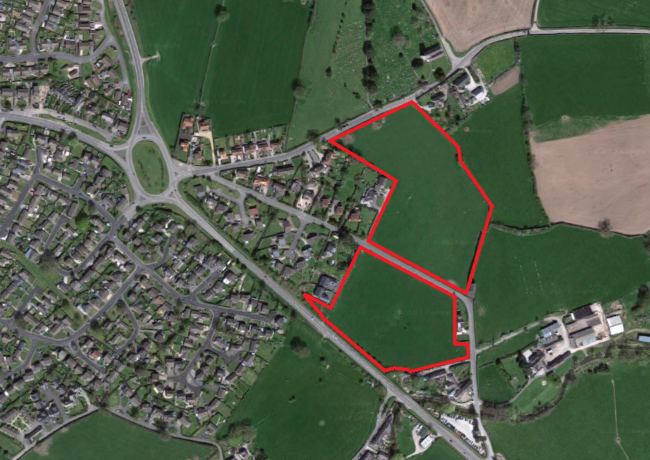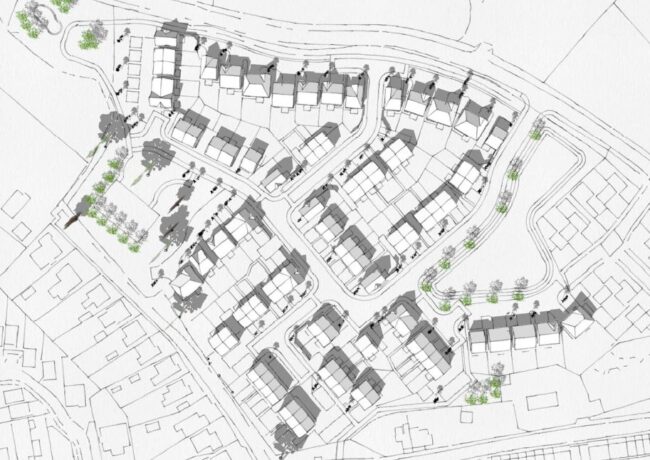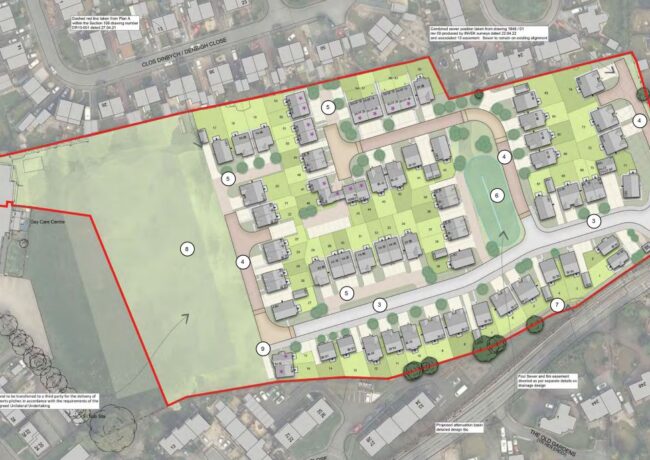Denbigh homes approved after public inquiry
A 75-home development in Denbighshire that was refused planning permission looks set to go ahead after a local inquiry found in favour of the developer.
The proposals by Pure Residential for the 7.2 acre site include 14 four-bed houses, 34 three-bed houses, six three-bed bungalows, nine two-bed houses and 12 two-bed bungalows, with its main access via Old Ruthin Road.
The site was promoted by Denbighshire Council for residential use in its 2013 development plan.
The planning application for the development was originally rejected, despite being recommended for approval by planning officers, in April this year, after the council claimed it would have “an unacceptable impact upon highway safety”.
The council also argued the scheme would have “an unacceptable impact upon the character and amenity of the area by virtue of its density, design, and scale”, and was “contrary to the site development brief” issued in 2016.
Although the council later withdrew its highway reason for refusal, local residents continued to object on the grounds of highway capacity and safety being compromised by the development.
This left the council’s single reason for refusal as the project’s effect on the character and amenity of the area.
Pure Residential took the decision to a local inquiry and employed transport planner SCP to support the application, alongside planner Pegasus Group. Gartner Town Planning and JBA Consulting acted for the council.
At the inquiry, an application for costs was made by Pure against the county council.
In a report dated 28 November following a site visit carried out in September, the independent inspector, Alwyn Nixon, said the council’s objection to the scale of the development “reflects its contention that fewer houses should be proposed on the site,” but argued its evidence “provided no coherent rationale for this”.
The inspector’s report added: “The council has articulated no specific objection to the scale of any individual building proposed within the development.”
The inspector also said an alternative layout for the site suggested by the council did not “have regard to a range of other practical planning requirements which would need to be taken into account in producing a viable, realistic, and workable site layout”.
Local residents also continued to object against the development’s impact on local highways, but this was dismissed by the inspector.
The report said: “Objectors to the proposal commissioned a critique of the transport assessment, which made a number of criticisms on points of detail. However, the author of the report did not give evidence at the inquiry, and I found [Pure Residential’s] evidence to the inquiry on highways matters on the whole to be robust and reliable.
“I share the highway authority’s view that the level and mix of traffic likely to be generated by the proposed houses would not substantially alter traffic conditions at this point, and that the existing highway layout is adequate from a highway safety standpoint.”
The report concluded that there were “no material considerations which indicate a determination otherwise than in accordance with the development plan”, and granted planning permission for the development subject to conditions.
A full award of costs to the developer was also made against the council, after the inspector agreed that the council’s initial decision to object on highway grounds had resulted in the residents instructing their own consultant, even though the council later withdrew
This meant the developer had no option but to provide their own professional witnesses.
David Roberts, director of SCP, said; “This is not the first time that a council has bowed to public pressure to resist a development that meets with the aims of the Development Plan, and it will not be the last.
“However, there is a strong message from the inspector’s report that if a development proposal meets with the development plan allocation and a council refuses planning permission without being able to justify their decision, then the council is at risk of costs being awarded against them, even if they later decide not to pursue a reason for refusal at an appeal.”
Place North West understands Pure plans to start the development in three to six months’ time, following completion of detailed design works as stipulated in the planning conditions.
Denbighshire Council was contacted for comment.





Yet another case of a council ignoring its own officers. About time the Councillors were hit with Tariffs for the costs. Perhaps the Planning Committee can explain to their residents how much this has cost the council after they went against their appointed experienced officers. What local services will need to be cut to fund this in Denbighshire when all they have done is slow down the delivery of much-needed homes in line with their own plan. Local press should be aware that costs are only awarded to the applicant when it is proved that a council has “behaved unreasonably”
By Cynic